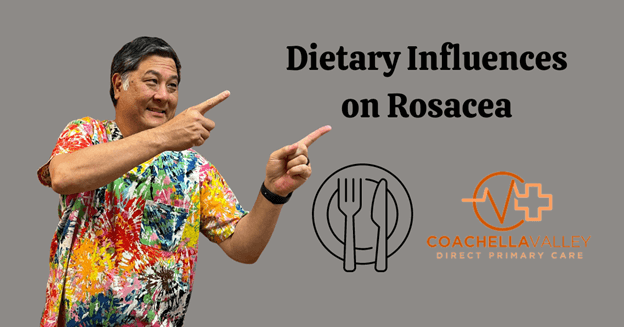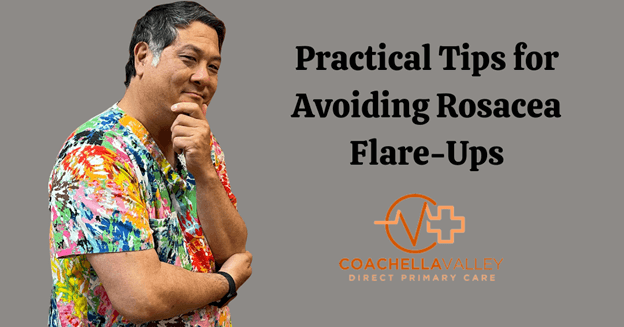Welcome to the world of Coachella Valley Direct Primary Care. It’s not just a phrase; it’s your new secret weapon against rosacea. Imagine stepping outside, feeling the sun gently kiss your face without fearing an imminent flare-up. Sounds almost too good to be true, right? Well, buckle in because we’re about to embark on a journey that redefines skin care in our sunny enclave.
The Coachella Valley is no stranger to vibrant lifestyles and even more colorful culinary adventures. Yet, for those battling rosacea, such indulgences often come with a price – unwanted redness and irritation. But what if I told you that managing this capricious skin condition could become as effortless as applying sunscreen before hitting one of our famed golf courses?
Gone are the days when spicy foods were off-limits and hot beverages were met with caution rather than anticipation. With Coachella Valley Direct Primary Care by your side, navigating through common triggers becomes less about avoidance and more about balance.
Coachella Valley Direct Primary Care
Frustration-free health care for the whole family. A monthly membership program designed for the busy Coachella Valley family to give you direct access to primary healthcare services so you can be healthy and active. Schedule a free consultation. 760-642-5549

Table Of Contents:
- Understanding Rosacea and Its Common Triggers
- The Sun’s Role in Rosacea Flare-Ups
- Dietary Influences on Rosacea
- Stress Management Techniques to Control Rosacea
- Skincare Products for Sensitive Skin with Rosacea
- Practical Tips for Avoiding Rosacea Flare-Ups
- Finding Support and Professional Care for Rosacea
- Conclusion
Understanding Rosacea and Its Common Triggers
Rosacea is a skin condition that affects millions worldwide, causing redness, flushing, and sometimes even bumps on the face. It’s a chronic condition that can be frustrating to deal with, but understanding what triggers your flare-ups is key to managing it.
While the exact cause of rosacea is still unknown, several factors have been identified as common triggers for this skin condition. By being aware of these triggers and making lifestyle changes to avoid them, you can significantly reduce the frequency and severity of your rosacea symptoms.
What is Rosacea?
Rosacea is a chronic skin condition that primarily affects the face. It causes redness, flushing, and sometimes even bumps or pimples. According to the National Rosacea Society, over 16 million Americans suffer from rosacea.
While anyone can develop rosacea, it’s most common in fair-skinned middle-aged women. The symptoms can range from mild to severe and may come and go over time.
The Most Common Triggers Identified
Several factors have been identified as common rosacea triggers, including:
- Sun exposure
- Emotional stress
- Hot weather
- Wind
- Heavy exercise
- Alcohol consumption
- Hot baths
- Spicy foods
- Certain skincare products
While triggers can vary from person to person, these are some of the most frequently reported ones. Keeping a journal of your flare-ups can help you identify your personal triggers.
How Lifestyle Affects Rosacea
Your daily habits and lifestyle choices can have a significant impact on your rosacea symptoms. For example, spending a lot of time outdoors without proper sun protection can lead to more frequent flare-ups.
Similarly, a diet high in spicy foods or alcohol can exacerbate rosacea symptoms. Stress is another major factor, as it can cause blood vessels to dilate and trigger a flare-up.
On the flip side, making positive lifestyle changes like practicing stress-reduction techniques, wearing sunscreen daily, and avoiding trigger foods can help keep your rosacea under control.
The Sun’s Role in Rosacea Flare-Ups
For many people with rosacea, the sun is enemy number one. Even just a few minutes of sun exposure can cause a major flare-up, leaving your skin red, inflamed, and uncomfortable.
In fact, according to a survey of 1,066 rosacea patients, sun exposure is the single most common trigger for rosacea flare-ups. A whopping 81% of respondents said that the sun aggravated their symptoms.
Importance of Sun Protection
Given the significant role that the sun plays in rosacea flare-ups, it’s crucial to prioritize sun protection if you have this skin condition. This means more than just slapping on some sunscreen before a day at the beach – you need to make sun protection a daily habit.
Here are some strategies for shielding your sensitive skin from harmful UV rays:
- Use a gentle, fragrance-free, broad-spectrum sunscreen with an SPF of at least 30 every day, even when it’s cloudy.
- Reapply sunscreen every two hours or more often if you’re swimming or sweating.
- Wear a wide-brimmed hat and sunglasses when outdoors.
- Seek shade, especially during the midday sun when UV rays are strongest.
- Consider investing in UV-protective clothing for added protection.
By prioritizing sun protection, you can significantly reduce your risk of rosacea flare-ups and keep your symptoms under control.
Dietary Influences on Rosacea

You are what you eat, and if you have rosacea, what you eat can have a big impact on your skin. While dietary triggers can vary from person to person, some common culprits are known to aggravate rosacea symptoms.
Spicy Foods and Hot Beverages
Spicy foods and hot beverages are two of rosacea’s most frequently reported dietary triggers. Capsaicin, the compound that gives chili peppers their heat, can cause a burning sensation and trigger a flare-up.
Similarly, hot beverages like coffee or tea can cause facial flushing and make rosacea symptoms worse. If you find that spicy foods or hot drinks trigger your rosacea, it’s best to avoid them or consume them in moderation.
Alcohol’s Impact on Rosacea
Alcohol is another common trigger for rosacea flare-ups. Red wine, in particular, seems to be a major culprit – in one survey, 76% of respondents said that red wine aggravated their symptoms.
But it’s not just red wine – other alcoholic beverages like white wine, beer, and hard liquor can also cause problems for people with rosacea. Alcohol dilates blood vessels, which can lead to facial flushing and make rosacea symptoms worse.
If you find that alcohol triggers your rosacea, it’s best to avoid it altogether or limit your consumption to special occasions. And if you do drink, opt for non-alcoholic alternatives or dilute your drinks with water or soda.
Stress Management Techniques to Control Rosacea
Stress is a major trigger for rosacea flare-ups. When you’re stressed out, your body releases hormones that can dilate blood vessels and make your skin more reactive.
In fact, according to a survey by the National Rosacea Society, stress is among the top five factors that make rosacea worse. So, if you want to keep your rosacea under control, it’s important to find ways to manage your stress levels.
Here are some stress management techniques that may help:
- Practice relaxation techniques like deep breathing, meditation, or tai chi.
- Exercise regularly to reduce stress and improve your overall health.
- Get enough sleep – aim for 7-9 hours per night.
- Make time for hobbies and activities you enjoy.
- Connect with friends and family for social support.
By incorporating stress management techniques into your daily routine, you can help prevent rosacea flare-ups and keep your symptoms under control.
Skincare Products for Sensitive Skin with Rosacea
When you have rosacea, your skin is extra sensitive and reactive. Using the wrong skincare products can trigger a flare-up and make your symptoms worse.
That’s why it’s so important to choose skincare products that are specifically formulated for sensitive skin and free of common irritants.
Choosing the Right Skin Care Products
When shopping for skincare products, look for ones that are:
- Fragrance-free
- Non-comedogenic (won’t clog pores)
- Gentle and non-abrasive
- Free of alcohol, menthol, and other irritants
- Formulated for sensitive skin
Ceramides, niacinamide, and azelaic acid are some ingredients that may be beneficial for rosacea-prone skin. However, always patch-test new products before applying them to your face to ensure they don’t cause irritation.
Hair Care Considerations
It’s not just your skincare products that can trigger a rosacea flare-up – your hair care products can also be a problem. Shampoos, conditioners, and styling products can all contain irritants that can aggravate your skin.
When choosing hair care products, look for ones that are:
- Sulfate-free
- Fragrance-free
- Gentle and non-irritating
Be careful when applying hair products. Try to avoid getting them on your face, and rinse thoroughly if they do come into contact with your skin.
Practical Tips for Avoiding Rosacea Flare-Ups

In addition to identifying and avoiding your personal triggers, there are some practical steps you can take to prevent rosacea flare-ups in your daily life.
Environmental Factors to Consider
Extreme temperatures and weather conditions can be major triggers for rosacea. Here are some strategies for mitigating these effects:
- Stay cool in hot weather by seeking shade, using fans or air conditioning, and drinking plenty of cold water.
- Protect your face from cold and wind by wearing a scarf or ski mask.
- Use a humidifier in dry indoor environments.
- Avoid hot baths, saunas, and other sources of extreme heat.
Makeup and Rosacea
While you don’t have to give up makeup entirely if you have rosacea, it’s important to choose cosmetics that won’t aggravate your symptoms. Here are some tips:
- Look for makeup products that are specifically formulated for sensitive skin.
- Avoid heavy, oil-based foundations and opt for lighter, water-based formulas instead.
- Use a green-tinted primer to help neutralize redness.
- Choose cream-based blushes and eyeshadows instead of powders, which can be more irritating.
- Remove all makeup gently and thoroughly at the end of the day.
By being mindful of environmental factors and choosing the right makeup products, you can help prevent rosacea flare-ups and keep your skin looking and feeling its best.
Finding Support and Professional Care for Rosacea
Dealing with rosacea can be frustrating and isolating at times. But it’s important to remember that you’re not alone – millions of people worldwide are living with this chronic skin condition.
Seeking support from others who understand what you’re going through can be incredibly helpful emotionally and practically.
The Role of Support Groups
Joining a rosacea support group can provide a sense of community and connection with others who are facing similar challenges. These groups can be a great source of information, advice, and encouragement.
Some benefits of joining a rosacea support group include:
- Learning about the latest research and treatment options
- Getting tips and advice from others who have experience managing rosacea
- Sharing your own experiences and struggles in a supportive environment
- Feeling less alone and more understood
You can find rosacea support groups online or through organizations like the National Rosacea Society.
Getting Professional Help
While lifestyle changes and trigger avoidance can help manage rosacea symptoms, sometimes professional medical treatment is necessary for optimal results. A dermatologist who specializes in treating rosacea can develop a personalized treatment plan based on your specific symptoms and triggers.
Treatment options may include:
- Topical medications to reduce redness and inflammation
- Oral antibiotics to treat bumps and pimples
- Laser or light therapy to reduce visible blood vessels
- Lifestyle recommendations and trigger avoidance strategies
If you’re struggling to control your rosacea symptoms on your own, don’t hesitate to seek professional help. With the right treatment plan and support, it is possible to effectively manage this chronic skin condition and improve your quality of life.
Key Takeaway:
Get a grip on rosacea by knowing your triggers, like the sun and spicy foods, and make lifestyle tweaks for relief. Sunscreen every day, chill on the hot eats and drinks, manage stress smartly, pick skin-friendly products, and when in doubt, see a pro.
Conclusion
So, here we are at the end of our journey through Coachella Valley Direct Primary Care’s world. We’ve traversed the realms of rosacea triggers and discovered that life in Coachella Valley can still be as vibrant and full without constantly fearing a flare-up. It’s not just about dodging what we love; it’s about embracing balance with open arms.
The sun doesn’t have to be your enemy if you play by the rules of protection, and spicy foods and beverages don’t necessarily mean danger—moderation is key. Remember, stress might fuel the fire of symptoms, but finding your zen could help douse those flames.
Choosing skincare products isn’t rocket science when you know what works for sensitive souls like us. And let’s not forget, sometimes, a little help from professionals or support groups can light up our path to managing this condition better than ever before.
This narrative flips every scary story about living with rosacea on its head. Because yes, even amidst challenges posed by this capricious skin condition, life in Coachella Valley remains unapologetically lively – all thanks to a balanced approach backed by smart choices and reliable care options like Coachella Valley Direct Primary Care.

